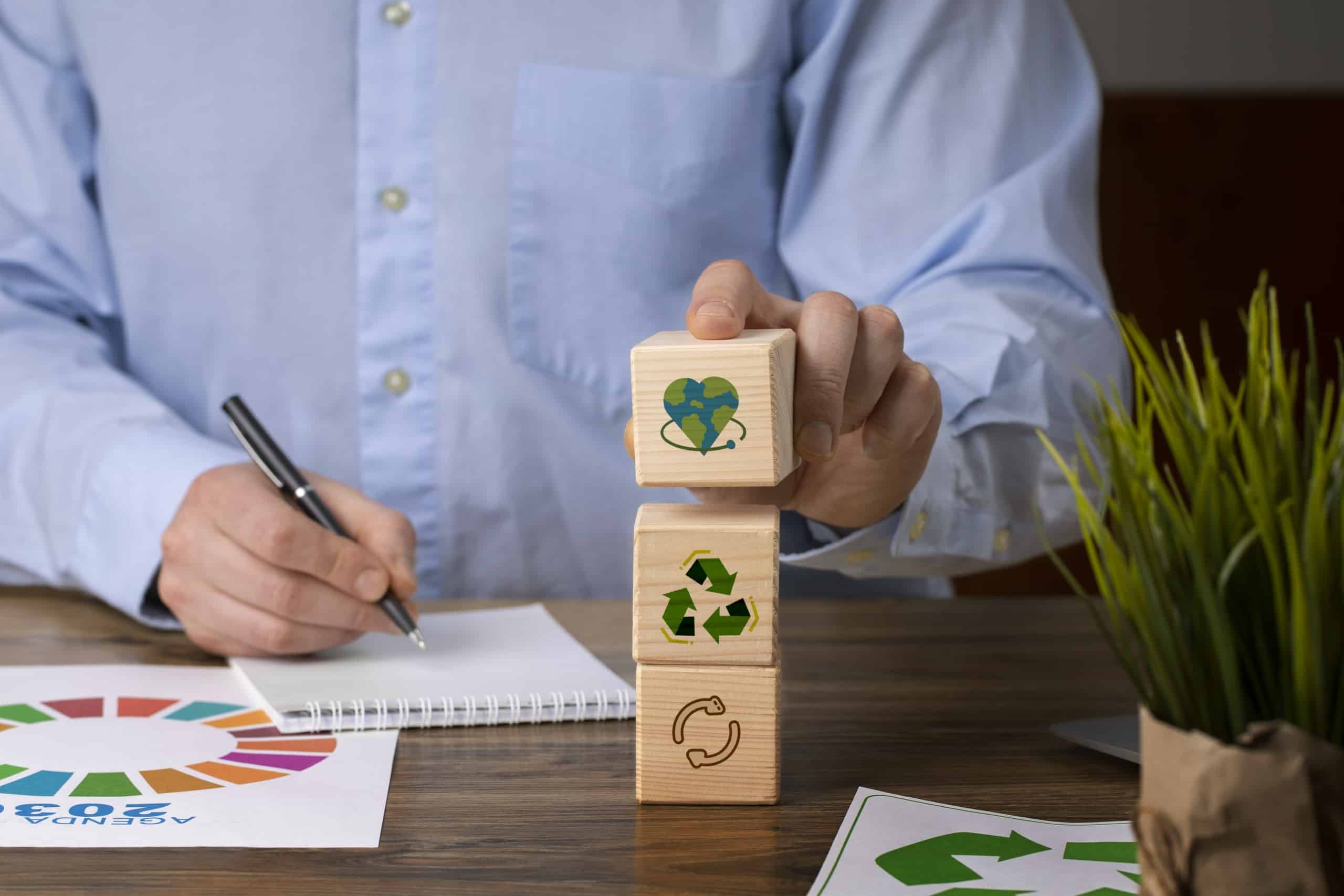Understanding the Plastic-Free Mandate
By prohibiting plastic from being a component of single-use wet wipes, the 2024 plastic-free requirement seeks to drastically lessen the environmental effect of these products. Conventional wet wipes often use synthetic fibers made of plastic, such as polyester or polypropylene. Due to their slow rate of decomposition and ability to persist in ecosystems for decades, these fibers are a contributing factor to environmental contamination. They may block sewer systems and contribute to “fatbergs,” which are big, solid masses in metropolitan sewage systems that are created by combining fat and non-biodegradable garbage if they are not disposed of appropriately. Governments, particularly in areas like the UK, are taking a proactive stance in addressing these escalating environmental issues with this mandate.
Wet wipes manufacturers are required under the prohibition to switch to natural, biodegradable fibers from plastic ones. Alternative materials are being investigated, including cotton, bamboo, and other plant-based fibers. But adjusting to these new materials is more complicated than just changing out one part for another. Because plant-based fibers have special qualities including strength, durability, and absorbency, they need to be handled differently. As wet wipes manufacturers strive to create sustainable wipes that are efficient, long-lasting, and satisfy customer needs for quality and performance, this change necessitates both innovation and investment.
Additionally, since conventional manufacturing equipment may not be equipped to handle biodegradable materials effectively, the regulation forces businesses to reassess their production methods. The industry is moving toward more technologically sophisticated and sustainable manufacturing techniques as a result of this change. By enacting this requirement, governments want to promote a more circular economy in the personal care industry, where goods are made with a sustainable life cycle in mind, from procurement and production to disposal. This poses a problem as well as an opportunity for manufacturers to take the lead in environmentally friendly manufacturing, adapt to changing customer preferences, and guarantee adherence to new environmental laws.
How Wet Wipes Manufacturers Are Adapting to Plastic-Free Production
Wet wipes manufacturers are using several tactics to comply with the plastic-free regulation, with creativity and sustainability at the center of their adjustments. Making significant investments in research and development (R&D) to produce sustainable, plastic-free substitutes has been the first and most important step. Eco-friendly materials must now meet or surpass the durability, softness, and affordability of plastic-based fibers, which were formerly preferred for these attributes. Bamboo, cotton, and viscose are examples of biodegradable fibers that are being thoroughly researched and tested to make sure they continue to meet customer performance requirements. R&D teams are trying to improve these materials’ durability, texture, and absorbency so that the final product satisfies customer demands without sacrificing sustainability.
Wet wipes manufacturers are reengineering their wet wipes manufacturing lines to accept these novel, biodegradable materials in addition to inventing new materials. Numerous manufacturing processes for wet wipes have been modified to operate with synthetic fibers, which behave differently from their plant-based counterparts. For biodegradable fibers to be processed efficiently without breaking or losing their integrity during manufacture, specialist apparatus or modifications to already-existing equipment may be needed. To minimize waste and enable smooth transitions between various biodegradable materials, wet wipes manufacturers are investing in sophisticated, flexible gear. This change guarantees adherence to rules and establishes businesses as progressive pioneers in sustainable manufacturing.
To ensure steady access to plant-based fibers, businesses are forming alliances with environmentally conscious suppliers, making the sourcing of sustainable raw materials a top concern. Natural materials may vary in price and availability based on global demand, weather patterns, and agricultural cycles, in contrast to synthetic fibers, which are comparatively plentiful. Wet wipes manufacturers must establish robust, dependable supply networks to sustain production levels and reduce expenses. To ensure that their goods not only comply with the letter of the law but also reflect customers’ growing environmental consciousness, many wet wipes manufacturers are now forming alliances with suppliers that specialize in organic and certified sustainable materials.
Lastly, as part of their adaption process, wet wipes manufacturers are pledging to be certified and compliant. Companies must adhere to stringent regulatory requirements, which often include third-party certifications for biodegradability and compostability, to sell wet wipes as plastic-free and eco-friendly. In addition to being essential for regulatory compliance, these certifications are also valuable marketing tools as they foster customer confidence among environmentally concerned buyers. Although the certification process may be expensive and time-consuming, it gives wet wipes manufacturers the confidence to market their goods as environmentally friendly, plastic-free, and in compliance with the most recent laws. To reassure customers about the authenticity and environmental advantages of their goods, wet wipes manufacturers are placing a greater emphasis on transparency in their labeling and emphasizing these certifications on their packaging.
In conclusion, wet wipes manufacturers are being forced to innovate in all facets of production, from supply chains and compliance to materials and equipment, as a result of the shift to plastic-free wet wipes. In addition to complying with new laws, wet wipes manufacturers are joining the rising worldwide trend toward ecologically friendly goods by investing in sustainable materials and manufacturing techniques. In a time of growing environmental consciousness, this change helps them better serve a market that values sustainability, enhancing their brand image and fostering client loyalty.
Overcoming Compliance Challenges
Wet wipes manufacturers now face several compliance issues as a result of the shift to plastic-free wet wipes. They must make sure their products satisfy performance and environmental requirements while maintaining their competitiveness in the market. The price of raw materials is one of the biggest obstacles. Natural, biodegradable fibers like viscose, cotton, and bamboo are often more expensive than synthetic polymers. Price structures may be upset by this rise in material costs, which might result in increased prices for customers. To combat this, wet wipes manufacturers are looking at long-term supplier relationships, bulk buying, and material optimization techniques to reduce costs without compromising the caliber or affordability of their products. This targeted procurement keeps biodegradable wipes competitive and available as the industry transitions to manufacture without plastic.
Making sure the product works without synthetic fibers is another major challenge. Customers have become used to the durability, softness, and absorbency of wipes made of plastic. Rethinking material compositions and treatments is necessary to achieve these properties with plant-based fibers. For example, cotton may need to be treated to improve absorbency, while bamboo fibers may need specific processing to provide a softer feel. To improve the performance of biodegradable fibers and enable plastic-free wipes to rival their conventional counterparts in terms of comfort and efficacy, wet wipes manufacturers are investing in technology. Furthermore, as wet wipes manufacturers strive to refine products that satisfy both compliance criteria and customer expectations, testing, and quality assurance procedures have become increasingly stringent.
Navigating the intricate certification and labeling standards is another step on the road to compliance. Wet wipes manufacturers must pass stringent testing and get regulatory body approval before they can advertise their goods as biodegradable or plastic-free. Third-party assessments of biodegradability, compostability, and overall environmental effects are often needed for this procedure, which may be expensive and time-consuming. Global compliance is a challenging task since wet wipes manufacturers must adhere to a variety of requirements in several jurisdictions, including the UK, the EU, and beyond. However, getting these certifications is crucial since it shows that the product complies with regulations and increases customer confidence in it. To appeal to a wider range of consumers and address various facets of environmental friendliness, many businesses are choosing to get several certifications, such as “biodegradable” and “compostable.”
Adapting production infrastructure adds another level of difficulty on top of these technological and legal obstacles. Traditional manufacturing processes that are designed for synthetic materials could not work with fibers derived from plants. To avoid ripping or deterioration during manufacture, certain biodegradable materials may need to be handled more gently or processed at a different temperature. To guarantee effective production with new materials, wet wipes manufacturers are modernizing their machinery and procedures. Automation is often used to increase accuracy and cut waste. Despite the high initial expenditures, this infrastructure upgrade is essential to preserving production efficiency and satisfying regulatory standards with the least amount of output level disturbance.
Lastly, one of the most important ways to overcome compliance issues is to educate and coordinate with suppliers. Wet wipes manufacturers are responsible for making sure their supply chain partners are aware of and follow the guidelines for sustainable sourcing. To ensure that raw materials are both sustainably sourced and biodegradable, they must collaborate closely with suppliers. When working with foreign suppliers, where standards and procedures may differ, this alignment may be more difficult. Wet wipes manufacturers may get premium materials that satisfy ethical and legal requirements by establishing solid, open partnerships with suppliers. Additionally, it guarantees compliance and strengthens the reputation of the business by enabling constant quality in the finished product.
It takes a complex strategy that incorporates creative production, savvy sourcing, and stringent certification to overcome these compliance issues. Wet wipes manufacturers may position themselves as leaders in a market that is becoming more environmentally sensitive by proactively tackling these issues and strengthening their brand’s commitment to sustainability in addition to meeting legal requirements.
Meeting Consumer Demands with Sustainable Production
Customers are more attracted to companies that share their beliefs as environmental awareness rises, especially when it comes to sustainability. To satisfy these customer aspirations, wet wipe manufacturers must actively adopt sustainable manufacturing methods that complement eco-friendly lifestyles, going beyond just regulatory compliance. Establishing trust begins with transparent marketing and unambiguous labeling. Consumers of today are looking for authenticity and want to know how their purchases will affect the environment, thus using labels like “plastic-free,” “biodegradable,” or “compostable” on packaging makes it easier to communicate the product’s environmental advantages. Numerous wet wipes manufacturers are earning certifications from reputable environmental groups, which add legitimacy and reassure customers that the product supports their sustainability objectives.
Creating niche eco-friendly product lines has also gained popularity. Brands may stand out in a crowded market and satisfy customers who care about the environment by providing a specific line of biodegradable, plastic-free wet wipes. Some businesses are going one step further and developing completely environmentally friendly wet wipes that employ natural, organic substances in their formulations, such as essential oils and plant-based solutions for scent and antibacterial qualities, in addition to avoiding plastics. These high-end eco-friendly collections appeal to a certain market of buyers who are prepared to shell out a little more for goods that align with their environmental principles, enabling companies to expand their product lines and satisfy customer demands for eco-friendly goods.
In addition to the actual product, companies are using eco-friendly packaging options to further demonstrate their dedication to the environment. Since single-use plastic packaging adds to waste, several firms are looking into packaging materials that are recyclable, biodegradable, or compostable. To reduce packaging waste over time, several firms are even experimenting with reusable wet wipe containers. These packaging options appeal to customers who value waste reduction in their purchases in addition to lessening the product’s environmental impact. Brands demonstrate a comprehensive commitment to sustainability by investing in eco-friendly packaging, extending their attention to the environment beyond the product to all facets of its lifespan.
Working together with sustainability activists and environmental groups enhances a brand’s standing as an environmentally conscious leader. Wet wipes manufacturers may reach new customer populations who are especially driven by environmental reasons by supporting environmental projects or joining eco-certification schemes. These collaborations may improve a brand’s reputation and provide a feeling of purpose among environmentally concerned customers, who are more inclined to support businesses that support environmental concerns. Furthermore, these partnerships often result in marketing possibilities that may increase the brand’s awareness in the sustainable market, such as co-branded campaigns or inclusion in lists for eco-friendly products.
To satisfy sustainability expectations, consumer education initiatives are also essential. Many customers may be unaware of the environmental effects of selecting plastic-free, biodegradable items. Brands may encourage more educated purchase choices by informing customers about the advantages of sustainable wet wipes, such as less microplastic contamination, improved biodegradability, and less waste going to landfills. Digital material, social media marketing, and instructional inserts in product packaging may all help accomplish this. Customers are more inclined to stick with businesses that match their values when they are aware of how their decisions affect the environment, forging a close link based on a shared dedication to sustainability.
In conclusion, satisfying customer demand for sustainability requires a thorough strategy that extends beyond material replacement. Building a brand identity that appeals to environmentally concerned customers involves a variety of strategies, including transparent marketing, product range growth, sustainable packaging, environmental collaborations, and educational initiatives. Wet wipes manufacturers may position themselves as pioneers in a new, sustainable age of consumer products by addressing these factors, which also helps them meet regulatory requirements and seize a rising market sector. This strategy fosters customer loyalty while also bringing the business into line with more general environmental objectives, making a beneficial difference that customers can relate to.
Investing in Long-Term Sustainability
To position themselves as leaders in a market that is becoming more environmentally sensitive, wet wipes makers must engage in long-term sustainability. This goes beyond just satisfying current legal requirements. Companies must emphasize efficiency, cut down on resource waste, and implement strategies that support both corporate and environmental objectives to achieve long-term sustainability. One effective step in this regard is the use of smart technology and automation in manufacturing. Precision-controlled automated equipment may reduce material waste, maximize resource use, and improve energy efficiency. In addition to saving money, wet wipes manufacturers may also lessen their environmental impact and develop a more sustainable manufacturing model that supports international efforts to tackle climate change by using less energy and water.
Another crucial expenditure for enterprises that prioritize sustainability is implementing a circular economy strategy. Products in a circular economy are made to last, be reused, and be recyclable, resulting in a closed-loop system that reduces waste and increases resource efficiency. This might include creating naturally decomposing biodegradable wipes or looking at recyclable or compostable packaging solutions for the wet wipes business. To give plastic trash a new purpose and lessen their need for pure resources, several businesses are also investigating methods to integrate recycled materials into their product lines. Wet wipes manufacturers may satisfy customer demand for environmentally friendly goods and position themselves as active contributors to the global sustainability movement by adopting circular concepts.
Achieving long-term sustainability in the wet wipes sector also requires sustainable sourcing methods. Customers are considering a product’s whole lifespan, from the raw ingredients to the final disposal, as they become more conscious of environmental issues. To ensure that resources are supplied properly, wet wipes manufacturers are increasingly collaborating with suppliers that follow ethical and sustainable practices. This entails collaborating with suppliers that value environmentally friendly agricultural methods, minimize the use of chemicals, and carefully manage resources. By funding these collaborations, wet wipes manufacturers can establish a reliable, moral supply chain that supports their sustainability objectives and provides customers with responsibility and transparency across the whole product lifecycle.
Long-term sustainability is equally dependent on internal sustainability programs and employee training. A sustainable culture is promoted inside the firm by making sure that the employees are aware of and supportive of the eco-friendly purpose of the company. Employees may actively contribute to the company’s green aims by learning about waste reduction strategies, effective resource use, and sustainable production processes via training programs. This dedication is strengthened by internal measures including waste reduction plans, energy-saving regulations, and recycling programs. Employees who share the company’s values become advocates for environmentally friendly behavior both within and outside the office, which may increase productivity and sustainability overall.
For companies that are dedicated to sustainability, consumer interaction and education are crucial. Customers become more devoted to a company when they are informed about the advantages of eco-friendly items and how their decisions affect the environment. To convey the need to select sustainable wet wipes, manufacturers may fund educational initiatives using blog posts, social media, and package information. Businesses build solid, value-based relationships with their clients by outlining the advantages of employing biodegradable materials, less wasteful packaging, and sustainable sourcing for the environment. This educational effort reaffirms the company’s commitment to environmental responsibility while assisting customers in making informed decisions.
Last but not least, any long-term sustainability plan must include constant innovation and research. The field of sustainability is always changing as new methods, materials, and technology are introduced regularly. By investing in ongoing research and development, wet wipes manufacturers can keep ahead of these trends and integrate the most recent developments in sustainability into their manufacturing processes. Innovative businesses are always changing and becoming better, from investigating eco-friendly chemicals and substitute fibers to putting AI-driven predictive maintenance into practice. In addition to guaranteeing adherence to upcoming laws, this dedication to innovation establishes the brand as a pioneer in sustainability, establishing a benchmark that other companies in the sector may adopt.
Despite the possible upfront expenses, long-term sustainability investments eventually increase competitiveness, resilience, and consumer loyalty. Wet wipes manufacturers may steer the sector toward a more environmentally friendly future by incorporating sustainable manufacturing methods, embracing innovation, empowering staff, guaranteeing responsible sourcing, and adopting a circular economy approach. In addition to satisfying the demands of the current market, this all-encompassing strategy positions businesses for success as environmental consciousness and laws continue to influence the global consumer goods sector.






